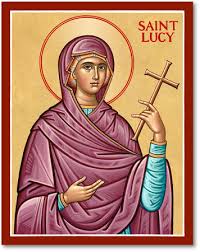The Pain of Entering Heaven – Memorial: St Lucy
(Isaiah 41:13-20; Ps 145; Mt 11:11-15)
***************************************************
Since John the Baptist, the violent take heaven by force. These are strange words. What do they mean?
The readings today invite us to enter into the hard work of healing, of transformation, of taking heaven by force.
Isaiah in the first reading speaks of a new creation, in which Israel will be given strength by God, just as God will make water and green growth appear in the desert where one would not usually find that. There is the Advent hope that we can experience a real newness of life.
In the gospel, Jesus continues to speak in symbolic language. If you are willing to accept it, John the Baptist is the Elijah who is to comeand since John the Baptist, the kingdom of heaven is taken by force.
What can all this mean? Those two men, Elijah and John the Baptist, are the key to understanding these harsh words of Jesus about the Kingdom of God. The invitation of today’s readings is to enter into a process of repentance, change, and the cross, or some suffering, as a way of taking heaven by storm.
Elijah was the great prophet of the OT. You may recall Elijah appeared to Jesus with Moses on the mountain of the transfiguration. They were talking to Jesus “about his passing that was to come in Jerusalem.” In the midst of that heavenly glory, they were talking about the violence Jesus would undergo, his passion and crucifixion, for our sake.
John the Baptist was the cousin of Jesus who leapt in his mother Elizabeth’s womb when Mary, pregnant with Jesus, visited her. John, in his mother’s womb, recognized Jesus in Mary’s womb. Likewise, Elizabeth recognized Jesus as her Lord with a loud cry, “How is it that the mother of my Lord should come to me?” And that recognition, and joy, drew an exultant Magnificat out of Mary.
Thirty years later, John came out of the wilderness, out of the desert where he lived, to prepare the way of the Lord. He told the people to face the pain of their mistakes and sins in the past, to repent, to confess their sins and be baptized, to let go of false pride and selfishness, as the way to prepare for the coming of Jesus. He was also the first one to recognize Jesus as the Messiah and as the Lamb of God. And he allowed his disciples to follow Jesus, the one who would baptize with the Spirit.
So, the message from these two men is clear. The way into the new creation that Isaiah speaks about is through repentance, change, and the cross, or some suffering. God wants to bring about a new creation of happy, free sobriety, a people able to live addiction-free lives, through repentance and the Cross.
That will take a new spirituality, a spirituality that is able to deal with pain. Richard Rohr, noted Franciscan priest and spiritual writer, tells us that “spirituality is all about what we do with our pain.” Ron Rolheiser adds the insight that “purgatory is the pain of entering heaven.”
One definition of an addiction, such as alcoholism or gambling, is an attempt to avoid legitimate suffering. A weak spirituality seeks to avoid pain, usually through an addiction which is a way to medicate pain.
Jesus showed us the way of faith, the way of the cross. He accepted to suffer and die for us so that he could rise from the dead and give us a new way of life, based on faith, hope and love, a life free from addiction.
For us, that means we must have the faith to deal with our issues instead of running away from them into addictions that medicate our pain. The only way through the pain of our past hurts is through the pain.
Rather than avoiding pain by running away or fighting back, we are to learn to have stronger faith in Jesus, and do what he did – learn to forgive those who hurt us and to accept our loses instead of staying stuck in grief.
That, I believe, is what it means “that since John the Baptist, the kingdom of heaven is being taken by force and by violence.” It is the violence of freely choosing to suffer the pain of healing, growth, facing the truth about ourselves.
The 12 Step program is actually one of the best ways to live out this gospel. It is a way to live our faith, to enter into the reign of God, the kingdom of heaven, to take it by force in a way, by freely choosing to deal with the pain of being human instead of running away from it. Anyone truly working those steps will embark on an Exodus Journey and experience the Paschal Mystery, as I wrote about in my book Walk A New Path.
Alfred Delp SJ, touches on this pain with this thought in the December issue of Living With Christ: The primary condition for a fruitful and rewarding Advent is renunciation, surrender. We must let go of all our mistaken dreams, our conceited poses and arrogant gestures, all the pretenses with which we hope to deceive ourselves and others.”

The saint we honor today certainly lived this message. St. Lucy was born in Syracuse, Italy, and martyred about 304. That violence of martyrdom she experienced because of her faith catapulted her right into heaven – one could say she took heaven by force. Unfortunately, details of her life have been lost in the ensuing centuries and now exist mostly in legends. During the Middle Ages, people suffering from eye trouble began invoking Lucy’s aid because her name is derived from lux (‘light’). She is also associated with festivals of life, especially in Scandinavia.

Celebration of the Feast of St Lucy
May the Eucharist we celebrate today strengthen us for that personal journey through our own spiritual pain to new life.
So remember, in the end, good spirituality is all about what we do with our pain. May we have the courage to do what Elijah and John the Baptist suggest, and prepare the way of the Lord through repentance, living our truth and doing the hard work of healing.




I guess today’s readings is each one of us must suffer in pain to enter the kingdom of God . We should be like Jesus himself like rather chose to die and suffer himself on the cross. He rather give up his life by carrying the heavy cross full of sorrows, bearing our sins and faults that we gave him. He went through his passion and death for us ; so we do not need to suffer all that pain in our lives. But, after his resurrection he has forgiven and heal us spiritually from the inside and hoping we can change as a person. This means God wants us to come to our senses to forgiving ourselves and to forgive one another who hurt us in the past. We are try to open our hearts and minds to let go all our faults and wrong doings that is painful. Most of us have pain and sufferings that we have to resolve and overcome instead running away from. We must overcome the pain in entering heaven to be closer to God. Amen . Many Blessings!
Thanks for the detail stories and teachings in facing the truth about ourselves and trying to face the pain whether how hurtful and sorrows it hidden inside us. This is also a choice in going through reconcilation and doing repentance for us to be fully healed as a person . So, we can strengthen our faith and love to be with God. We are to love God as we love ourselves and love one another. Just do what we can to overcome this pain that is troubling us in order to enter the Kingdom of God. You also mentioned this in the 12 step program and the book you wrote ” Walk a New Path ” Amen . Thanks Bishop Sylvain